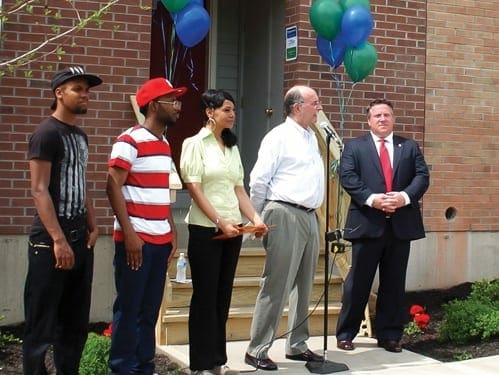Habitat for Humanity Capital District celebrated the completion of its 100th home built in the Albany area early last week. The house was sold to Sheila Wright, an Albany Medical Center employee, who was given the keys on Tuesday, May 12. The house, located in the Sheridan Hollow neighborhood in the City of Albany, marks the Capital District’s Habitat for Humanity’s 100th home built for and sold to a low-income family. It’s a milestone in the organization. “You have a few sights out there, and one of the real benchmarks in Habitat United States is getting to your 100th house,” said Habitat for Humanity Capital District Executive Director Mike Jacobson. The Capital District chapter finished about 50 houses in 2010 and only began building houses in the 1990s. The 100th home “means that over 250 children now have a room to call their own and have a quiet space to study and sleep,” Jacobson said in a released statement. Habitat for Humanity also built several two-family homes in Albany’s Sheridan Hollow neighborhood, which will mean a revitalization for the urban area, said Jacobson. The neighborhood is currently undergoing redevelopment. County Executive Dan McCoy said that he was happy a neglected playground behind the neighborhood may finally see some use. “Habitat gives back a good feeling to a family who might not have had the chance,” he said. Habitat works with low-income families to provide affordable housing and ensures the payments remain affordable. Payments are no more than 30 percent of the household’s gross monthly income, according to the organization’s website. Homeowners are chosen through an application process that determines the applicant’s economic and financial criteria.However, applicants must also provide a narrative on their situation, which Jacobson said drew him to Sheila Wright and her family. “One of the things that really stood out for me is that she demystifies who our hardworking low-income families really are. You don’t necessarily associate them working with Albany Medical Center with a white coat on, doing quality work,” said Jacobson. Most people, he said, associate low-income with working fast food jobs. Wright, a single mother of four sons, does administrative work at Albany Medical. While her sons are now older and only two still live at home, Wright said that she faced difficulties providing for her family. “I struggled with drug use,” said Wright. “I lost everything. I mean, I lived on the street. One day, I just got tired.” She said she kept praying for that kind of life not to be the legacy she leaves her children. “It’s not the life that I chose for them.” During that time, Wright said that she never thought about what she had hoped for in her future, but only about getting clean and back onto her feet. Owning a house, though, “was always a dream of mine,” she said. “I never thought about my dreams.” Wright said that when she found she had been chosen by Habitat for Humanity, she could hardly believe it. Her new home includes separate bedrooms for her and her sons, amenities and a balcony overlooking the Albany neighborhood. Jacobson said that Habitat will continue providing for low-income families like the Wrights, but hopes that the assumptions people have of such families will change for the community. “If we don’t find a way to ensure that our hard working low-income families remain a vital part of our economic structure, I think there’s going to be a rude awakening coming forward,” said Jacobson.
Celebrating a home
Leave Comment



